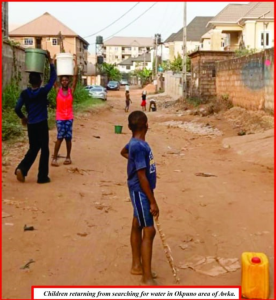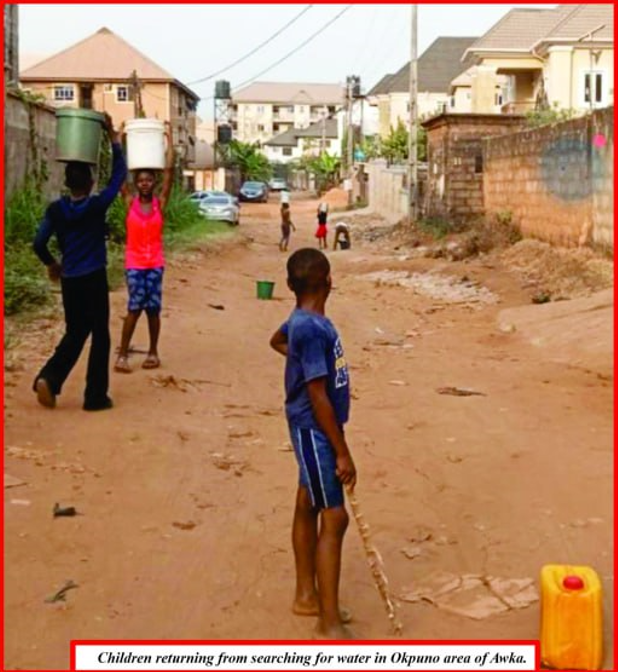… Water Scarcity, Heat, Mosquitoes Plague Anambra
As the erratic power supply continues to take its toll on private, social and business lives of the people across the five South East States, residents of Anambra State are buckling under the hardship it has brought, Ikeugonna Eleke reports.
An investigation by Fides, has however shown that the most painful aspect of the poor power supply in the state is the unavailability of water.
In Anambra, public water supply has been almost non-existent. For example, the state water supply and public utilities offices have remained only physical structures, with some of its members begging for retirement benefits after their service years.
As a result of this, many families rely on boreholes drilled in their residences with sumo, powered by electricity, for their water needs. But for close to two months now, electricity supply in most parts of Anambra have remained epileptic.
While most parts of Anambra have remained in perpetual darkness, other parts that are privileged to witness power supply can only get low voltage that seems far too low to power their water sumos, or any other household appliances.
 The high cost of fuel and gas, has also hampered many commercial water sellers from engaging in the business, making it hard for families to access water for their use. In many instances, many water vendors no longer sell water, while the few who do, sell at very exorbitant prices for containers, and, in most cases, are usually far away from the residences of those who need them.
The high cost of fuel and gas, has also hampered many commercial water sellers from engaging in the business, making it hard for families to access water for their use. In many instances, many water vendors no longer sell water, while the few who do, sell at very exorbitant prices for containers, and, in most cases, are usually far away from the residences of those who need them.
For example, in the Okpuno Area of Awka, most residents who live in high rise buildings, but cannot afford to pump water, using their private boreholes, have to rely on public boreholes, most of which are in faraway locations.
A resident, Mrs Rose Obasi, said: ‘In all the 10 years I have stayed in Awka, I have never experienced this level of suffering. Almost throughout this term, my children have been going late to school. The reason is that they wake up and go to fetch water every morning, before they can come back and prepare for school, time has already gone.
‘The stress they undergo to take water up to the third floor building where we stay is another work. We are really suffering, and I don’t know when this will come to an end.
Another resident of the area, Mrs Ifeoma Eke, decried the impact of the current situation on women and children who are saddled with the responsibility of fetching water for household use.
‘We now need to leave everything we have to do to go and look for water anywhere we see it. In many places, you buy one jerrycan for 50 Naira.
‘You can imagine the impact of the stress on every family. The children are out looking for water when they are expected to get busy with their homework,’ Eke bemoaned.
A final year student of Nnamdi Azikiwe University, Awka, Amara Chukwudi, was full of frustration over the situation which had made them to spend unnecessarily searching for water.
‘I bathed this morning with sachet water. There was no light and we could not find any means of pumping water in our hostel. Remember the price of petrol is equally unfriendly. Nigeria is fast becoming uninhabitable,’ she said.
A mother of three, Mariam Zaidu, also shared a discomforting tale about the water challenge.
‘More regrettably, this is happening at a time that heat is too much. My children could not sleep yesterday. At the same time, power supply had dropped drastically. We need urgent government intervention, honestly,’ she concluded.
In Onitsha, the densely populated commercial capital of Anambra State, electricity consumers have expressed worry over poor supply of electricity and called for withdrawal of licence from the power distribution firm, Enugu Electricity Distribution Company (EEDC).
Some of the consumers who spoke to Fides claimed that at this critical period of economic crisis where hyper-inflation of goods and services was the order of the day, EEDC had contributed in diminishing their economic fortunes through unnecessary power outage for long hours.
Mr. Oseka Ifeajuna, a businessman who owns a cold room in Onitsha, said Nigeria did not want to grow as an economic giant because of what she termed the selfish interests of owners of power distribution firms.
He argued that if the Federal Government under the then President, Goodluck Jonathan had considered some foreign electricity giants, poor electricity supply in Nigeria would have been a thing of the past.
He lamented that the high cost of fuel had also contributed to the downturn of his business as he had no other alternative to survive in his cold room business.
Mr. James Onyedika, a barber, criticized both the Federal Government and power distribution company, EEDC, for short changing Nigerians economically.
Onyedika said that the Federal Government and the EEDC were contributing to mass poverty in the country through their policies and actions.
He described the Federal Government and the power distribution company as agents of darkness who did not want people to exist in the country.
Onyedika said that skilled youths were being suffocated in Nigeria under the present administration.
‘This government is hypocritical. They don’t want poor people to survive in this country. How can you ask people to engage in one skill or the other, but at the end come up with one policy to cage the same people you pretend to be helping?”
He called for the withdrawal of the operating licence of EEDC, saying: ‘It is highly unfortunate that a power distribution company managed by an Igbo man is contributing to poverty in the South East, knowing that Igbos are industrious people who own several businesses and could be easily affected by poor supply of electricity.’
Reacting to this, the EEDC has insisted that it has the power to supply electricity in the entire South East Zone, but stated that the supply of gas has been a major challenge.
In a press release by the spokesperson of the organization, Mr Emeka Ezeh, EEDC said: ‘We wish to inform our esteemed customers that the current state of power supply within our network which has resulted in a drop in supply availability is due to low power generation caused by gas constraints to the thermal generating companies.
‘This situation is beyond us, and this is not peculiar to EEDC. This development has resulted in low generation, leading to a reduction in the quantum of daily megawatt hour (MWH) of energy allocated to distribution companies nationwide.
‘Consequently, the Transmission Company of Nigeria (TCN), which is our primary source of power supply is constrained, as they only transmit what is generated and have resorted to System Load-shedding to forestall possible system collapse.
‘This situation has equally impacted the quality of service to our customers, as we are contending with very low energy allocation wheeled to us by the TCN for distribution to our customers. A situation that has left us load-shedding available power to ensure it goes round.’
Meanwhile, as things stand, with the current rate of the Dollar to the Naira, which has remained high, the procurement of gas supply may remain high for a long time, and this will continually affect the allocation of power to EEDC, for onward distribution to end users.
A resident, Mr Bala Usman, lamented: ‘It is even worse that it is happening at this time when the weather is so hot. With the level of heat we are experiencing, and non-availability of power, I’m afraid, we’re headed for the worst. Things have gone so bad, and we pray that this does not trigger a high level of emission of emotion from the people, especially with the current protest on hardship.’


